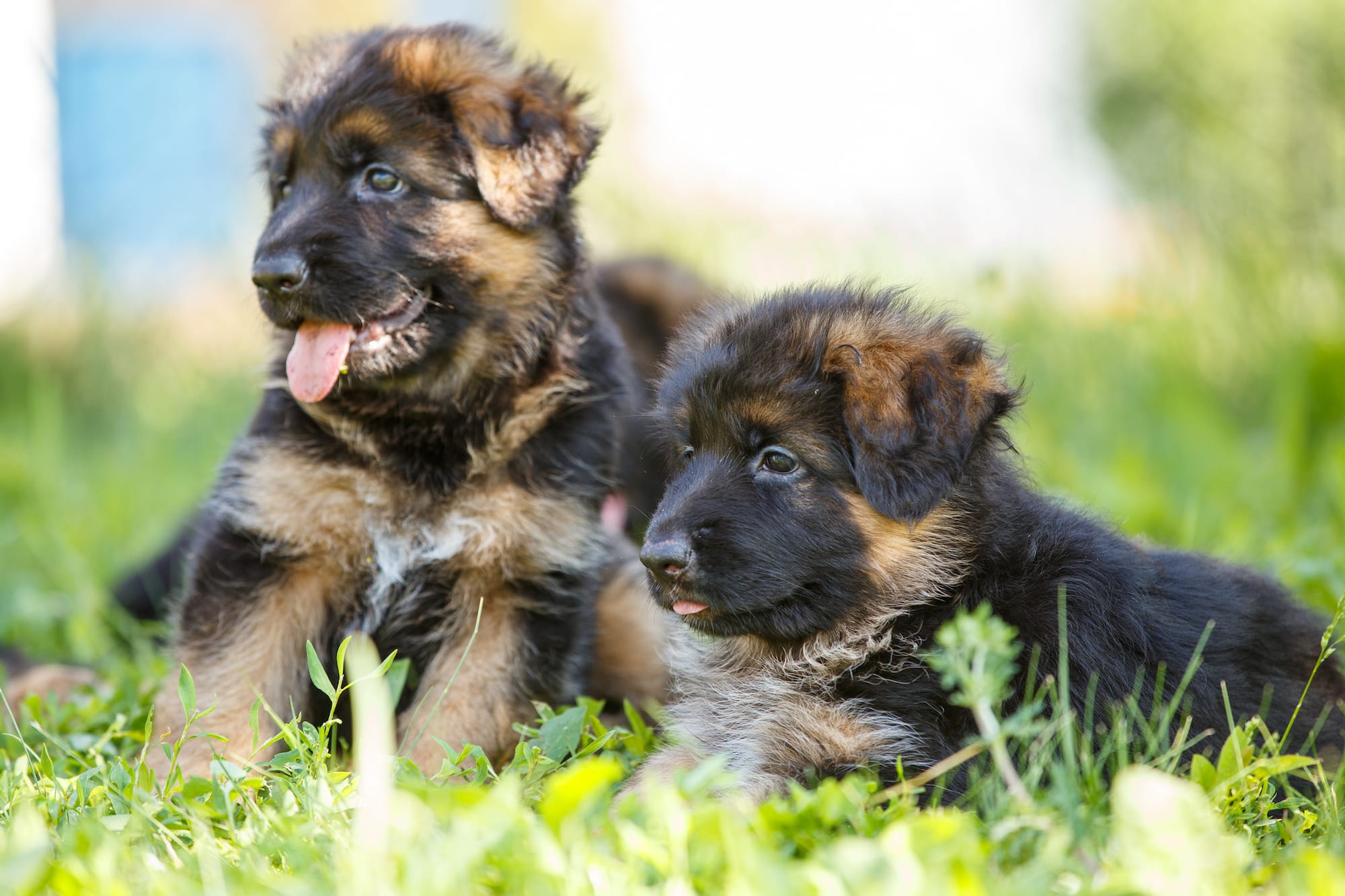The German Shepherd Dog (GSD) originated in Germany in the late 1800’s and was bred to have all the skills needed to successfully herd and guard grazing animals. They are intelligent dogs that love to work, making them great family pets for active families and useful as service dogs working with the Police, Border forces, Armed Forces and as support animals.
These powerful dogs, bred to herd and guard animals have loyalty, speed, intelligence and a keen sense of smell. They were first recognised by the Kennel Club in UK in 1919.
GSD’s are energetic, obedient dogs needing lots of exercise, and who love to be trained and to have a purpose. This makes them perfect to work with our armed services, police and border control, and they make great guard dogs. Their keen sense of smell makes them wonderful search and rescue dogs, too.
Poor early breeding practices has seen some GSD’s suffer with hip and elbow dysplasia. Recently, the fashion for an overly sloping back in show dogs has been frowned upon by vets and The Kennel Club as it results in dogs that find it difficult to stand properly. Breeders and The Kennel Club are working to reverse these trends in order to protect the breed and ensure puppies are healthy.
Pet profile
An intelligent, large dog that needs lots of exercise and loves to work. They have a think double coat and require grooming at least once a week.
- Size: large breed 55 – 65 cm tall (22 – 26 inches at the shoulder)
- Weight: 25 - 43 KG (55 – 95 Ibs)
- Life expectancy: 9-13 years
Exercise and nutrition
German Shepherd Dogs are energetic, needing about two hours exercise per day once fully grown. Their intelligence and curiosity mean they love to be trained and understand new commands quickly. They are great at agility and as working dogs and build strong attachments to their owners. It is important to socialise these dogs fully as puppies or they can become over-protective of their owners and home. To own and train such a powerful, intelligent dog is a responsibility which shouldn’t be taken lightly!
They need a good quality diet fed twice a day once they reach adulthood. The amount will depend on their levels of activity and age but your vet can provide feeding advice if you are unsure. Obesity in big breeds like the GSD can be dangerous, creating healthy problems which will affect your dog's quality of life. It is good to monitor their weight carefully throughout their life and adjust their diet if needed, with the help of your vet.
Common health problems and illnesses
Buying your puppy from a reputable, licensed breeder who screens their breeding dogs for hereditary diseases is the best way to ensure your puppy is healthy. It is thought that up about 19% of all GSD’s suffer from hip dysplasia and there are some hereditary conditions you should ask your breeder if they have screened for. Make sure you see the parents of the puppy you are considering buying, they have been screened for Degenerative Myelopathy and you know their hip scores, at the very least.
To ensure your dog has the best health care if they have an accident, fall ill or develop one of these conditions, take out dog insurance while your puppy is young, before they develop any problems.
This information is not designed to replace a vet consultation so if you ever think your dog is ill please consult your vet immediately.
There is a simple saliva test for this hereditary neurological condition and breeding dogs should be screened for it. It is a progressive, incurable degeneration disease of the nerves in the spine. Over time, the dog loses feeling and mobility in the hind limbs and then the forelimbs.
Typically, it is first seen at about 8 or 9 years of age when the dog starts to sway when moving. As the disease progresses the dog loses the ability to stand. There is no cure but physiotherapy can help some dogs stay mobile for longer.
This is a degenerative disease of the pancreas causing the production of digestive enzymes to decrease over time. This means absorption of nutrients from food is reduced and the dog loses condition, has terrible diarrhea and is always hungry. This condition can be painful and results in severe malnutrition but there is treatment. The medication will need to be taken daily for the rest of the animal’s life and it is expensive.
Abnormalities in the cartilage of the hip and elbow joints can cause GSD’s to suffer from dysplasia. This painful condition can lead to arthritis in the joints which might need surgery to enable the dog to keep active. It’s important to make sure your dog is kept at an ideal weight as obesity can exacerbate the problem, and that puppies are not allowed to climb stairs or jump up or off chairs or steps when young.
This horrible condition causes ulcers and inflammation around the dogs anus, which is uncomfortable and painful for the dog. There are treatments that include surgery and immunosuppressants.
Fun facts
- German Shepherd Dogs are one of the most popular breeds to own in UK.
- Strongheart, a GSD, was one of the earliest canine film stars. He was originally trained as a police dog in Berlin and served in the German Red Cross in WWI. He was then sold to an American and starred in several US films between 1921 and 1925. He has a star on the Hollywood Walk of Fame.
- Ten GSD’s have been awarded the PDSA Dickin Medal for conspicuous gallantry or devotion to duty in military conflict between 1945 and 2018.

